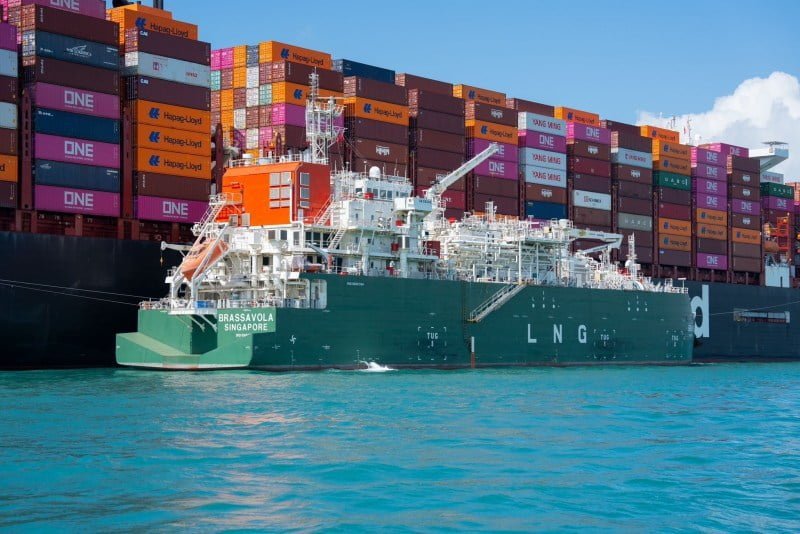Pavilion Energy achieves yet another significant milestone in its mission to promote sustainable maritime practices with the successful delivery of LNG to Hapag-Lloyd AG’s container vessel, Brussels Express, last Wednesday. This groundbreaking bunkering operation marks a pivotal moment as Pavilion Energy provides LNG to the world’s first ultra-large container ship, transitioning to LNG propulsion.
This accomplishment closely follows LNG bunker vessel Brassavola’s recent inaugural STS LNG bunkering operation in Singapore waters. where it involved delivering LNG to the Rio Tinto chartered dual-fueled bulk carrier Mount Api, This underscoring Pavilion Energy’s steadfast commitment to enhancing LNG bunkering capabilities.
Wolfgang Schoch, Senior Director of Regional Operations at Hapag-Lloyd, expressed satisfaction with the collaboration, stating, “We are delighted to partner with Pavilion Energy in LNG bunkering to ensure a reliable supply of LNG, thereby supporting our efforts to decarbonize our shipping operations.”
The refueling occurred at the Eastern Bunkering A Anchorage as the vessel continued its journey to North Europe Rotterdam and Wilhelmshaven.
Pavilion Energy extends heartfelt gratitude to esteemed partners, including the Maritime and Port Authority of Singapore (MPA), Mitsui O.S.K. Lines, Ltd., V.Group, and SLNG – Singapore LNG Corporation Pte Ltd, whose invaluable collaboration made this bunkering operation possible. Such collaborative efforts are crucial in driving progress towards a cleaner maritime future.

As a wholly owned subsidiary of Temasek and headquartered in Singapore, Pavilion Energy operates a fully integrated energy business encompassing downstream, marine, and regional operations, global LNG trading, shipping, and optimization, as well as upstream investments and energy hedging and financial solutions. With expansion plans into Europe and a steadfast focus on sustainability, Pavilion Energy is poised to contribute significantly to a more sustainable energy future driven by natural gas.
LNG bunkering, a crucial aspect of the maritime industry’s transition towards cleaner fuels, involves the transfer of liquefied natural gas (LNG) from a supply vessel to a receiving vessel, typically a ship, for use as fuel. This process plays a pivotal role in reducing emissions and promoting sustainability in the shipping sector, as LNG emits significantly fewer pollutants compared to traditional marine fuels such as heavy fuel oil. LNG bunkering operations can take place at various locations, including ports, terminals, or designated LNG bunkering facilities at sea. With advancements in LNG infrastructure and technology, LNG bunkering is becoming increasingly common worldwide, offering shipowners and operators a viable solution to comply with stringent environmental regulations while navigating towards a greener future for maritime transportation.
Source Pavilion Energy

